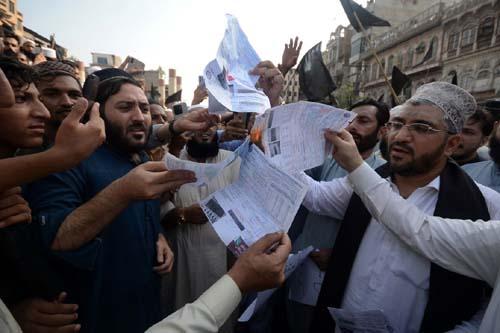
Power bills shock people
Long queues at facilitation centres for payment on instalments
Abida Shaheen
The residents of the metropolis, like the rest of the country, are exasperated with their electricity bills.
While protests continue in every town and market, marked by people burning the power bills, the utility service remains adamant on collecting the dues.
The contention of K-Electric is that it collects electricity charges and the rest of additions to the bill in shape of sales tax, extra tax, and other fees go into government’s coffers. The amounts on the bills for small consumers are truly shocking.

Daily lives of scores of households have become disrupted due to repeated visits to the KE facilitation centres or IBCs. People are seen pleading with KE staff to accept payments in instalments since they can’t pay their bills.
Consumers using less than 200 units are dazed holding electricity bills worth thousands of rupees.
After the National Electric Power Regulatory Authority (NEPRA) increased the price by four rupees per unit, the situation will become worse. An additional amount is being charged in the bills under the pretext of “tariff adjustment.” The tarrif adjustments have made electricity so expensive that people are forced to sell their household items or even part with gold jewelry to pay the bills.

Not hundreds but thousands of people have come to the city’s K-Electric offices (IBC Center) to make the installment of their electricity bills. A citizen stranding in a queue at KE IBC told The Express Tribune that he was the lone breadwinner in the household.
“How are we supposed to pay electricity bill of Rs18,000 from a salary of Rs30,000? There is no ration in the house, and we cannot live without electricity in a small house,” he said in a choked voice. People standing outside various facilitation centers of KE shared similar tragic tales while there was a long line of elderly people, and the women had come to make the installments of the electricity bill.
The power utility is charging Rs22 per unit from consumers using less than 200 units.
The lifeline consumer is paying tariff adjustment, fuel charges adjustment, general sales tax, electricity duty, and additional surcharge besides other hidden costs.
Subsequently, Naseem Ahmed, a user consuming 1.47 units in July was handed a bill of Rs5,314.

Similarly, a small family consuming less than 300 units was charged Rs27 per unit.
Sania Akhtar, an exasperated housewife, standing in line at DHA Phase II extension IBC showed a bill of 272 units with amount payable of more than Rs10,000.
Going upwards, consumers using 600 units are being charged Rs38 per unit.
Their bills, besides other charges, include around Rs6,000 as tariff adjustment.
As protests rage across the city and rest of the country, people urge the government to revise power tariff.
Power Utilities have no role in setting prices K-Electric spokesperson reiterated that the company understands the prevailing concerns regarding the rising electricity prices and shed light on the fact that power distribution companies operate in a regulated environment in the country and that electricity rates and applicable taxes are determined by NEPRA and the government of Pakistan.
As such, any stipulated changes will be applicable across the board on all DISCOs (Distribution Companies), including K-Electric.
Further, he mentioned that KE’s profitability or loss is not linked with an increase or decrease in electricity prices or taxes and in fact the former is associated with investments and an improvement in performance.
The spokesperson also emphasized that timely payment of bills is essential in ensuring an uninterrupted supply of electricity while power theft, illegal connections, and non-payment collectively become a hindrance, thus adversely affecting supply.
KE staff is diligently addressing power theft but facing hostility in some areas, hindering their duties and potentially disrupting vital services. The company urges government support to ensure staff safety and uninterrupted electricity provision.
KE condemns violence against its employees and values their well-being.
The company also commends customers and representatives combating power theft, facilitating fellow citizens, and fostering positive societal change.
